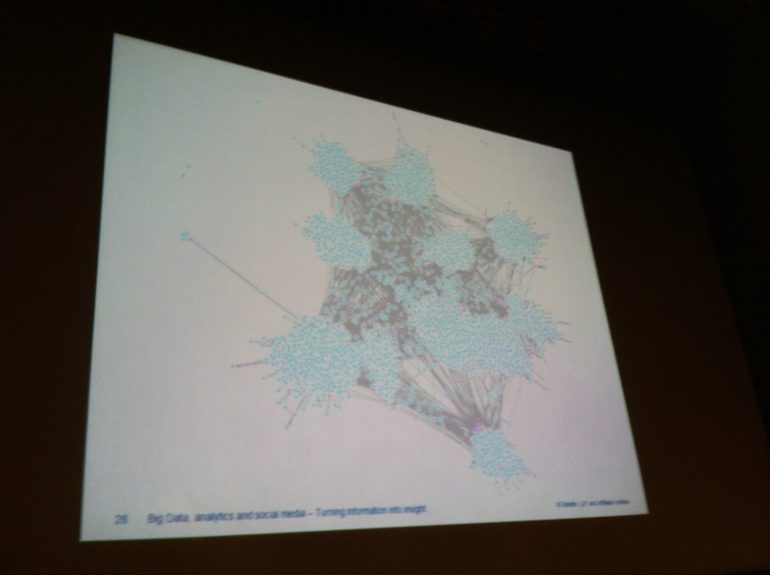According to Gartner’s 2013 hype cycle for emerging technologies, big data resides almost at the summit of “the peak of inflated expectations”. This means that the next stop is a deep dive into “the trough of disillusionment”, and that big data will reside in a period of technological purgatory for at least 5-10 years.
Needless to say, it looks like someone at Gartner doesn’t buy all of the headlines this past few years..
In hosting an event titled “CIO’s and Big Data” the Vancouver Enterprise Forum attracted enough skeptics, fence sitters, and fanboys to sell out the VanCity theater. The panel discussion moderated by Delloite’s Jacob Kuijpers featured:
-
Cameron Uganec, Director of Marketing at Hootsuite
-
Stephen Ufford, Founder & CEO of Trulioo
-
Bruno Aziza, VP, Worldwide Marketing at SiSense
-
Tommy Levi, Senior Data Scientist at PlentyofFish.com
In spite of the seemingly growing number of headlines about big data these past few years- particularly this one from the Economist in early 2010, which helped sparked my interest in the subject- Kuijpers suggests it’s really nothing new. He points out that big banks and even Walmart having been crunching big numbers long before this became topical. I comes as no surprise, as mathematics doesn’t really make for the most riveting headlines.
Kuijpers framed the conversation by asking “why is big data seemingly ‘all the rage?’ He offered a working definition as one of “volume, velocity, variety (beyond simply, text, and numbers neatly delineated in columns and rows).” With the addition of mobile-generated data and social media, the sheer volume of information to collect and process today is tsunami-like for most companies. For instance, Kuijpers shares that Westjet estimates they capture approximately 10 terabytes of data from each plane on every flight. One terabyte is one trillion bytes.
What kind of data do you need for your business?
Uganec offers up that “Hootsuite is tracking user behaviour to create more tailored and relevant messaging to their users” Talk about volume too, as he said its users are sending four million messages a day.
Aziza spoke about “raising visibility, what’s going inside your company? What’s the relationship between effort and impact (correlation vs causation)?”
For Levi, it “starts with questions relevant to the business, not the tech… forgot the buzz word, it’s not magic. Start small… Small samples that are statistically relevant can produce valuable results too.”
On one hand Aziza also made the point that “there should be no constraints in terms of what or how much data to collect as it’s so cheap to store now. Collect it all. In so many cases people don’t know what data to collect.”
Yet Ufford talks about the calculating and computing costs as being potentially astronomical if you don’t have a data science plan. “We got the bill! $130,000 from Amazon Web Services bill to crunch the data to get an answer for 3 questions! Businesses want answers, whereas data guys want data.”
Levi appreciates that there’s huge challenges in terms of collecting and storing data. “How and when, and when to extract data is a further a challenge. As the scientist on the panel points out, it’s crucial to have a well thought out foundation in terms of how you organize the data. It’s data science: form a hypothesis and test it.”
Does Big Data matter?
Uganec has no qualms suggesting “we are at the peak of the hype curve. Delivering insights is what matters most.”
For Aziza “the word big is relative. What’s the subjective value of the data?” He offers up the analogy “that data equals the elephant; the rider of the elephant is the data scientist… ensuring the elephant from simply running amok.”
Is Big Data only for big companies?
Aziza doesn’t see this about the size of a company, it’s about telling him what he doesn’t know. “Do your Infographics actually deliver useful information, or just look pretty, which means it’s just art! Understand what’s going outside your walls… Competitive insights matter.”
From a startup perspective Ufford offers “the best entry point is asking what’s the most difficult, most onerous, pressing question for big companies or an entire market,” he said. “Tackle those answers and with enough runway a startup can be left holding something of value.”
Why do they see in the future for Big Data?
In terms of wrapping up the conversation Levi was on mark by reinforcing that “the value of big data resides in the quality of the questions you ask from it. Know your core business! Data needs to be telling a story!”
Probably the most salient point of the evening was Aziza saying “we need to figure out the relationship of data to people… we need to make data work for “us”.
For the serious and the curious big data can transcend the hype, and make a significant impact beyond just business. It will be a key aspect for improving healthcare for instance. While machines might churn through 0’s and 1’s at mind altering rates and efficiencies, they’ll notlong supplant our capacity to tell meaningful stories.


